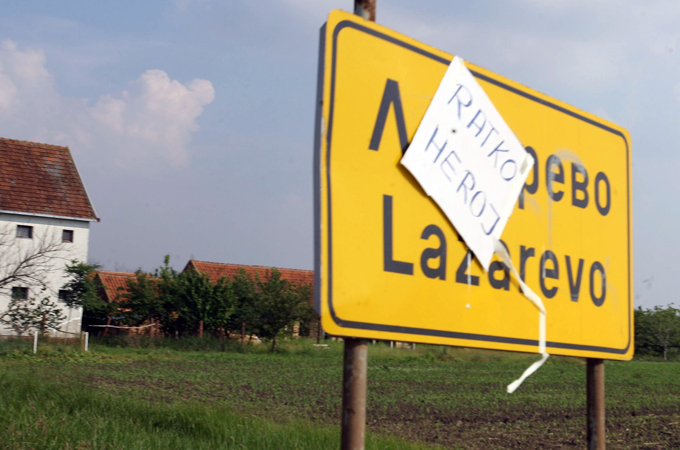Court finds Ratko Mladic fit for extradition
Serbian judge says Bosnian Serb general is fit to stand trial at The Hague for alleged war crimes.

Ratko Mladic, the wartime Bosnian Serb general accused of genocide, has been ruled fit to stand trial at The Hague for alleged war crimes, a Serbian judge has ruled.
“Mladic’s lawyer was delivered the extradition papers and he has until Monday to appeal,” judge Maja Kovacevic said on Friday.
The 69-year-old had undergone tests by a medical commission “which has determined he is fit for further proceedings” Kovacevic said.
Milos Saljic, Mladic’s lawyer, said he would appeal against the extradition, and that his client was not able to be handed over until his health was stable.
A judge had earlier suspended the interrogation of Mladic, who appeared frail and haggard at a court appearance on Thursday.
The general’s son, Darko Mladic, said his father had suffered two strokes during his 15 years on the run, and has a partially paralysed right hand and can barely speak.
“We are almost certain he cannot be extradited in such a condition … He is in very bad shape,” he said.
Darko added that Mladic’s “stand is that he’s not guilty of what he’s being accused of”.
Alleged war crimes
Mladic, who is accused of multiple war crimes charges, now faces extradition to The Hague where he would be tried by a tribunal prosecuting cases relating to conflicts during the 1990s in the former Yugoslavia.
| IN DEPTH: SREBRENICA | |
| |
| Safe Haven: survivors return | |
| Inside Story: Serbia’s apology | |
| Veterans: The siege of Sarajevo | |
| Bosnia marks 15 years since massacre | |
| Rageh Omaar: The secret life of Karadzic |
The former army commander, who led Bosnian Serb forces during the 1992-95 Bosnian war, is alleged to have orchestrated the killing of 8,000 Muslim men and boys in the town of Srebrenica in 1995, as well as the four-year siege of Sarajevo.
One of the world’s most wanted fugitives, Mladic was captured in a pre-dawn raid on Thursday by intelligence agents in the village of Lazarevo, in northern Serbia, ending a 16-year manhunt.
The United Nations International Criminal Tribunal for the former Yugoslavia (ICTY) in The Hague accuses Mladic of genocide, crimes against humanity and war crimes. Announcing his indictment in 1995, tribunal judge Fouad Riad said there was evidence against Mladic of “unimaginable savagery”.
Mladic’s lawyer told Thursday’s closed-door extradition hearing that his client did not recognise the authority of the UN tribunal.
“He is aware that he is under arrest, he knows where he is and he said he does not recognise The Hague tribunal,” Milos Saljic said.
Bruno Vekaric, Serbia’s deputy war crimes prosecutor, said that Mladic was taking a lot of medicine, but had responded “very rationally to everything that is going on.”
‘Our difficult history’
Boris Tadic, the Serbian president, said in a speech announcing the arrest that Mladic would be extradited, but did not give a specific timeframe.
“Today we closed one chapter of our difficult history that will bring us one step closer to full reconciliation in the region. All criminals must face justice.”
“Impunity has really been withdrawn from war criminals,” said Richard Goldstone, the prosecutor in the 1995 indictment. “It’s a very different world, and the prospects of them standing trial one day have been heightened considerably.”
According to Al Jazeera’s Aljosa Milenkovic, Mladic was arrested at 05:30 (03:30 GMT) on Thursday. He was clean shaven, looked very much to himself, but much older. His right arm was apparently paralysed and he did not resist arrest.
Rasim Ljajic, the minister in charge of the search for fugitive war criminals, said Mladic “looked pale as if he had stayed indoors for a long period of time”.
“Mladic had two loaded guns he did not use. He was co-operative and did not resist arrest,” he said. “He spoke calmly with officers.”
Pro-Mladic demonstration
Prosecutors at The Hague had said they believed Mladic was hiding in Serbia under the protection of people who considered him a hero. There were reports that he had been seen in Belgrade in 2006, but he had lived openly in the country prior to the fall of Slobodan Milosevic in 2000.
 |
| Residents of Lazarevo held demonstrations on Thursday in support of Mladic, with this sign on the sign for the village reading “Mladic Hero” [EPA] |
The Serbian government, meanwhile, has banned all public gatherings and tightened security in the country in order to prevent ultra-right wing nationalists from fulfilling their pledge to hold protests.
The Serbian Radical Party called Mladic a “hero”, and described his arrest as “one of the hardest moments in Serbian history”.
Hundreds of pro-Mladic demonstrators in the northern city of Novi Sad tried to break into the offices of the governing Democratic Party but were prevented by riot police. At least two people were reported injured.
Small demonstrations were also held in Lazarevo, the town where he was captured, with a sign reading “Mladic Hero” appearing on the sign at the entrance of the village.
Radovan Karadzic, the Bosnian Serb wartime political leader and Mladic’s mentor, was captured in Belgrade in July 2008 and is currently on trial at The Hague.
In a message from his jail cell, Karadzic regretted the arrest of Mladic.
“President Karadzic is sorry for General Mladic’s loss of freedom and he looks forward to working with him to bring out the truth about what happened in Bosnia,” Karadzic’s American lawyer, Peter Robinson, told The Associated Press shortly after visiting Karadzic.
